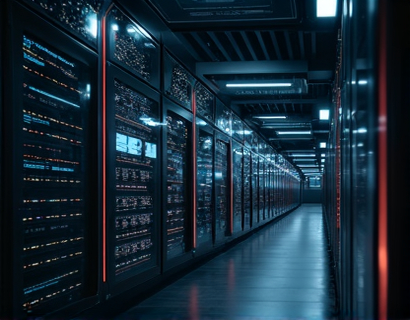Autonomous AI Agents: Revolutionizing Business Efficiency Through Blockchain and Multi-Technology Automation
In the rapidly evolving digital landscape, businesses are constantly seeking innovative solutions to enhance efficiency, reduce costs, and gain a competitive edge. One of the most transformative advancements in this realm is the integration of Autonomous AI Agents, particularly through the convergence of blockchain technology and multi-technology automation. These agents are not just tools; they are revolutionizing the way businesses operate by automating complex tasks, optimizing workflows, and ensuring seamless integration across various platforms.
The concept of Autonomous AI Agents involves the deployment of intelligent systems that can operate independently, making decisions and performing tasks with minimal human intervention. These agents leverage advanced AI algorithms, machine learning, and natural language processing to understand, adapt, and execute tasks efficiently. When integrated with blockchain technology, these agents gain an additional layer of security, transparency, and decentralization, making them ideal for businesses that handle sensitive data and require robust security measures.
Blockchain Integration for Enhanced Security and Transparency
Blockchain technology, known for its immutable and transparent ledger, provides an ideal environment for Autonomous AI Agents to function. By utilizing blockchain, these agents can ensure that transactions and data exchanges are secure, tamper-proof, and verifiable. This is particularly crucial in industries such as finance, supply chain, and healthcare, where data integrity and security are paramount.
The integration of AI agents with blockchain enables the creation of smart contracts that can automatically execute, control, or document legally relevant events and actions. These smart contracts can be programmed to trigger specific actions based on predefined conditions, ensuring that processes are executed precisely and efficiently. For instance, in supply chain management, AI agents can monitor the movement of goods, verify authenticity, and automatically update inventory levels on the blockchain, reducing the need for manual intervention and minimizing errors.
Multi-Technology Automation for Comprehensive Workflow Optimization
Autonomous AI Agents do not operate in isolation; they are designed to work across multiple technologies and platforms. This multi-technology automation capability allows businesses to create a cohesive and integrated ecosystem where different systems and applications communicate and collaborate seamlessly. By breaking down silos and enabling interoperability, these agents can optimize workflows across various departments and functions, leading to significant improvements in productivity and efficiency.
For example, in a manufacturing setting, AI agents can integrate with IoT devices to monitor machinery performance in real-time, predict maintenance needs, and schedule repairs automatically. Simultaneously, these agents can interact with ERP systems to update inventory levels, adjust production schedules, and optimize resource allocation. This holistic approach ensures that all aspects of the business are aligned and operating at peak efficiency.
Advanced AI Solutions for Intelligent Decision-Making
The true power of Autonomous AI Agents lies in their ability to process vast amounts of data, identify patterns, and make intelligent decisions. Machine learning algorithms enable these agents to learn from past experiences, adapt to new inputs, and improve their performance over time. This capability is particularly valuable in complex business environments where decisions need to be made quickly and accurately.
In the context of financial services, AI agents can analyze market trends, assess risks, and recommend investment strategies with a level of precision and speed that human analysts cannot match. In customer service, these agents can handle a wide range of inquiries, from routine support to complex issue resolution, providing consistent and high-quality service around the clock.
Use Cases in Various Industries
The applications of Autonomous AI Agents span across multiple industries, each benefiting from tailored solutions that address specific challenges and opportunities.
In the healthcare sector, AI agents can manage patient data, schedule appointments, and monitor treatment plans, ensuring that healthcare providers can focus on delivering high-quality care. In the retail industry, these agents can analyze customer behavior, optimize inventory, and personalize marketing campaigns, leading to increased customer satisfaction and higher sales.
In the logistics and transportation sector, AI agents can optimize routes, predict delivery times, and manage fleet operations, reducing costs and improving service levels. For technology companies, these agents can automate software development processes, manage cloud resources, and ensure system uptime, allowing developers to focus on innovation.
Benefits of Implementing Autonomous AI Agents
The adoption of Autonomous AI Agents offers numerous benefits that can significantly enhance business operations and competitiveness.
Firstly, these agents can dramatically increase efficiency by automating repetitive and time-consuming tasks. This allows employees to focus on higher-value activities that require human creativity and critical thinking. Secondly, the integration of blockchain ensures that all transactions and data exchanges are secure and transparent, reducing the risk of fraud and errors. Thirdly, the multi-technology automation capability enables businesses to create a unified and streamlined workflow, breaking down departmental silos and fostering collaboration.
Moreover, the intelligent decision-making capabilities of AI agents provide businesses with actionable insights and data-driven strategies, enabling them to make informed decisions quickly. This can lead to faster time-to-market, improved customer experiences, and a stronger market position.
Challenges and Considerations
While the benefits are substantial, businesses considering the implementation of Autonomous AI Agents should be aware of certain challenges and considerations.
First, the initial investment in AI and blockchain technology can be significant. Businesses need to evaluate their budget and resource allocation to ensure a smooth transition. Secondly, there is a need for skilled professionals who can develop, maintain, and manage these advanced systems. Upskilling the existing workforce or hiring new talent with the right expertise is crucial.
Additionally, businesses must address concerns related to data privacy and compliance. Ensuring that AI agents adhere to regulatory standards and protect sensitive information is essential. Finally, there is a risk of over-reliance on automation, which can lead to job displacement. A balanced approach that combines automation with human oversight and intervention is necessary to mitigate this risk.
Future Trends and Innovations
The field of Autonomous AI Agents is rapidly evolving, with ongoing research and development pushing the boundaries of what is possible.
One emerging trend is the integration of edge computing, which allows AI agents to process data closer to the source, reducing latency and improving real-time decision-making. This is particularly beneficial for applications in IoT and smart cities, where immediate responses are critical.
Another area of innovation is the development of more sophisticated AI models, such as generative adversarial networks (GANs) and reinforcement learning, which can enhance the capabilities of AI agents in areas like content creation, predictive maintenance, and complex problem-solving.
Furthermore, the rise of decentralized AI platforms is enabling a new paradigm where AI agents can collaborate and share knowledge across different organizations and industries. This decentralized approach can lead to more robust and resilient AI systems, capable of addressing global challenges collectively.
Conclusion
Autonomous AI Agents represent a significant leap forward in business efficiency and innovation. By leveraging the power of blockchain and multi-technology automation, these agents can transform the way businesses operate, from enhancing security and transparency to optimizing workflows and making intelligent decisions. While there are challenges to consider, the potential benefits are immense, making this an exciting and promising area for businesses looking to stay ahead in the digital age.










































